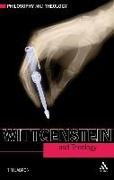Read more
Zusatztext "Does Wittgenstein's philosophy lead to atheism? Is it clearly religious? Both of these questions have been answered in the affirmative. A study of Wittgenstein's key concepts of logic and language in his major works from the Tractatus Logico-Philosophicus to the Philosophical Investigations and On Certainty reveals how he came to see in his later work that meaning is shown in how words are woven into the community of concretelife practices. A discussion of Christology and Luther's distinction between the theologian of glory and the theologian of the cross provides theological analogies for Wittgenstein's later philosophy. It also provides important evidence to show—through examples of scripture, liturgy, and practice—that Wittgenstein's philosophy is a useful tool that can fit with theology" -- Shofar Informationen zum Autor Tim Labron is Professor and Department Chair in Philosophy and Religious Studies at Concordia University of Edmonton, Canada. He is author of Science and Religion in Wittgenstein’s Fly Bottle (Bloomsbury, 2016), Bultmann Unlocked (Bloomsbury, 2011), Wittgenstein and Theology (Bloomsbury, 2009), and Wittgenstein’s Religious Point of View (Bloomsbury, 2006). Klappentext A unique guide to Wittgenstein's philosophy and how it fits with theology. Vorwort A unique guide to Wittgenstein's philosophy and how it fits with theology. Zusammenfassung Despite the increasing awareness and use of Wittgenstein's philosophy within theological circles the puzzle persists: 'Does his philosophy really fit with theology?' This is a guide to Wittgenstein's philosophy and how it fits with theology. Inhaltsverzeichnis Part I Wittgenstein 1 Introduction 2 Short Biography Part II Philosophy 3 Wittgenstein and Philosophy 4 Wittgenstein's Later Philosophy Part III Theology 5 Wittgenstein and Theology 6 Wittgenstein and the Theologian 7 Wittgenstein in Theological Practice 8 Explanations, Doubt and Redemption Notes Bibliography Index...

